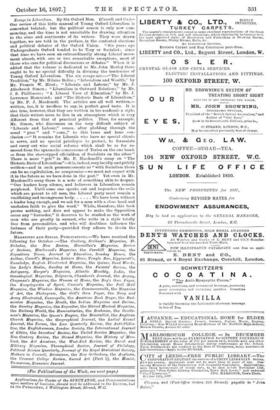Essays in Liberalism. By Six Oxford Men. (Cassell and Co.)—
Our review of this little manual of Young Oxford Liberalism is somewhat belated; but the political season is only now com- mencing, and the time is not unsuitable for drawing attention to the aims and sentiments of its writers. They were drawn together, we are told in the preface, in the contested elections and political debates of the Oxford Union. "Six years ago Undergraduate Oxford tended to be Tory or Socialist ; since that time we have seen an extraordinarily strong Liberal move- ment absorb, with one or two remarkable exceptions, most of those who care for political discussions or debates." When it is added that the volume is dedicated to Mr. John Morley there ought to be no special difficulty in divining the tendencies of Young Oxford Liberalism. The six essays are :—" The Liberal Tradition," by Mr. Hilaire Belloc ; "Liberalism and Wealth," by Mr. Francis W. Hirst ; "Liberals and Labour," by Mr. J. Allsebrook Simon ; "Liberalism in Outward Relations," by Mr. J. S. Phillimore ; "A Liberal View of Education," by Mr. J. Lawrence Hammond; and "The Historic Basis of Liberalism," by Mr. P. J. Macdonell. The articles are all well written,— written, too, it is needless to say, in perfect good taste. It is also true, however, that they are written in too academic a style, that their writers seem to live in an atmosphere which is very different from that of practical politics. Thus, for example, Mr. Simon, who discourses on the very difficult subject of "Liberals and Labour," comes, after plodding through the usual " pros " and "cons.," to this tame and lame con- clusion :—" It remains for Liberals who have no special clients to serve, and no special privileges to protect, to formulate and carry out wise social reforms which shall be as far re- moved from the spasmodic concessions of Tories on the one hand, as from the stereotyped officialdom of Socialists on the other." There is more " grit " in Mr. P. Macdonell's essay on "The Historic Basis of Liberalism"—it is, indeed, very lucidly and pithily written—and in such pronouncements as "with Socialism there can be no capitulation, no compromise—we must not coquet with it in the future as we have done in the past." Yet even in Mr. Macdonell's essay there is a note of something akin to despair. "Our leaders keep silence, and believers in Liberalism remain perplexed. Until some one speaks out and impeaches the evils which are patent to all men, the Liberal party must remain a
vacillating and incongruous body We have been without a leader long enough, and we ask for a man with a clear head and unshaken faith to give the word." While, therefore, this book proves nothing, and does not appear to make the Opposition cause any " forrarder," it deserves to be studied as the work of men who are greatly in earnest, who write in a style totally free from personalities, and who will doubtless influence the fortunes of their party—provided they adhere to it—in the future.






































 Previous page
Previous page